Keep Reading
Hometown Bakery Turned 17-Location Franchise: How Scott & Meredith Layton Turned a Small Dream into a Nationally Recognized Brand
What does it really take to grow a small-town bakery into a 17-location franchise? In this episode, Meredith Layton, co-founder of Buttermilk Sky Pie Shop, shares how a simple dream, a deep love for people, and an unwavering commitment to relational business helped her turn one storefront into a thriving brand. From overcoming early challenges […]
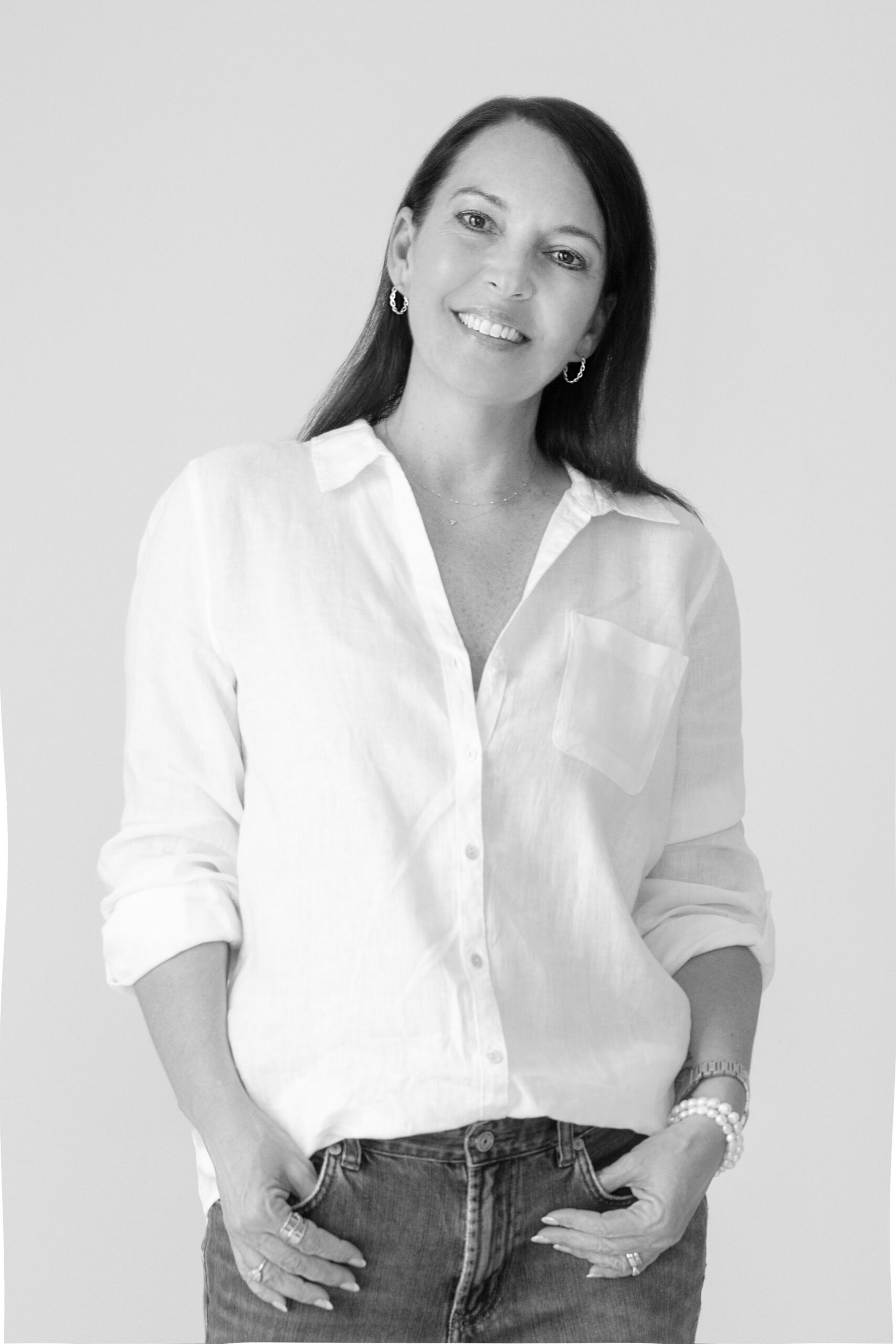
Paragraph
What does it really take to grow a small-town bakery into a 17-location franchise? In this episode, Meredith Layton, co-founder of Buttermilk Sky Pie Shop, shares how a simple dream, a deep love for people, and an unwavering commitment to relational business helped her turn one storefront into a thriving brand. From overcoming early challenges to creating an experience that feels like home, Meredith opens up about what has fueled their growth over the past 11 years—and why “share pie, share love” is more than a tagline.
Meredith shares candid lessons about money, motherhood, working with your spouse, and making peace with imperfection along the way. If you’ve ever wondered how to build a life-giving business without losing yourself in it, this conversation is a must-listen.
APPLE PODCASTS | SPOTIFY
Press play for the full interview or keep reading below!
- [00:00]: Introduction to Meredith Layton and Buttermilk Sky Pie
- [02:53]: The Journey to Entrepreneurship
- [06:00]: Transitioning from Cupcakes to Pies
- [09:05]: Family and Business: Balancing Act
- [11:48]: Building a Brand and Franchise Model
- [14:51]: Lessons from the First Five Years
- [17:51]: Marketing Strategies and Early Success
- [24:23]: The Miraculous Journey to the Pie Shop
- [27:44]: Building Relationships and Community Connections
- [30:55]: Navigating Financial Success and Business Growth
- [34:52]: Finding Work-Life Harmony and Boundaries
- [37:56]: The Importance of Hiring and Team Dynamics
- [41:33]: Quick Fire Round: Insights and Reflections
Meredith Layton’s Lifelong Entrepreneurial Spirit
Wow, the backstory is long and winding! Did I always want to own a business? Honestly, probably yes. Ever since I was a kid, I have loved playing “shop.” I’d make mud pies on the sidewalk, set up little stores in my playroom—you name it. I’ve always had an entrepreneurial spirit.
Was I always dreaming of a pie shop specifically? Not exactly. I didn’t know it would be the bakery business, but I’ve always been drawn to creative, business-minded pursuits. My educational background is actually in communication and psychology. I hold a master’s degree in speech pathology and audiology, which I used for many years. I worked with everyone from newborns to seniors in long-term care, and I genuinely loved that profession.
What’s interesting is how everything you do ends up connecting. Every step I took in my career prepared me in some way for what I’m doing now. It all builds toward something, even when you don’t realize it at the time.
Why the Shift From Speech Pathology to Pies?
Yes, I worked in the field of speech pathology for at least 15 years. But, like many people, I reached a turning point that was really about family. I’ve heard you talk about this on your podcast—how our values start to shape our time. For me, it was wanting more time with my husband and children.
I started to realize that the hours in my field were getting more rigid and less flexible. We saw an opportunity to build something of our own, something that could give us both a creative outlet and the ability to invest more time into our family. That’s really where the shift started—from asking, “What do I love?” to “How can we shape a life we love?”
The actual beginning of the business was kind of spontaneous. It was over Thanksgiving, actually. My sister was actually in nutrition and dietetics, but she started a cupcake shop in St. Louis. She came to visit in November the year we were first getting into baking. That’s what sparked my interest in baking, and we initially opened a cupcake bakery. That venture was what got me out of speech pathology in the first place. We were licensees of my sister’s cupcake brand and ran that for several years before making the shift into pies.
A Family Venture: Balancing Jobs and Entrepreneurship
At the time, my husband stayed in his full-time job in architectural engineering and commercial construction, which allowed me the flexibility to dive into running the bakery. We started out in Oak Ridge, Tennessee, in a small space, then moved to Knoxville as the business grew. Our love for owning a business became clear, and that was the beginning of our venture into pies.
Before the cupcake shop, I had explored other ventures, but the bakery was the first real business we built. After a while, we noticed the cupcake trend slowing down and felt there was an opportunity for something new—a pie shop. We grew up with grandmothers who baked amazing pies, and the craving for those nostalgic, homemade pies sparked an idea.
On the drive back from visiting my sister, Scott and I were talking, and I said, “I’m craving pie!” He agreed, saying, “There’s nowhere to get good pie.” That conversation set the wheels in motion. We began baking pies at home and sharing them with friends and small groups. Even while running the cupcake shop, we started the pie shop down the street. Eventually, we phased out cupcakes and focused entirely on pies, which started to grow faster than we expected.
By the end of our first year with the pie shop, we knew we wanted to take it to the next level. That’s when we decided to build a franchise model. It’s been a long and varied journey, but that conversation about craving pie truly sparked the idea for the future we’re building now.
Motivations Behind the Transition: More Flexibility and Family Time
When we made the transition from speech pathology to opening the bakery, the motivation was a combination of things. First and foremost, it was about flexibility. With the cupcake business, I could create my own schedule, which was a huge change from the rigid hours in speech pathology. At that time, our youngest child was in kindergarten, and our older son was about 11. The bakery was right next to the school, so I could pick up my kids in the afternoon and even bring them along if needed. It gave us a sense of freedom that my old job just couldn’t offer.
But it wasn’t just about flexibility. We also wanted to grow our income independently. In speech pathology, I had a salary cap, but with the bakery business, there was the opportunity to scale and create something bigger.
Beyond financial independence, we also wanted to give our kids a different perspective. We wanted to build strong family values and show our kids what hard work and entrepreneurship look like. My husband, Scott, grew up on a farm, so that model of family and work ethic was something we wanted to pass on. It wasn’t just about making money—it was about creating a legacy, fostering community, and giving back in meaningful ways.
Meredith Layton’s Transition from Cupcakes to Pies
Wow—there’s so much to share here, so I’ll try to touch on each part just a little. You’re absolutely right about how the cupcake venture with my sister worked. First of all, I have to say—I truly have the best sister in the world. She has so much patience, kindness, and loyalty. She was incredibly generous to license her cupcake brand and recipes to us.
Now, here’s the thing: when you have two entrepreneurs in the same family, that can be a little tricky. We were probably the worst people to license a product to because we just have that constant drive to tweak and change and improve things. That’s what entrepreneurs do! Now, having become franchisors ourselves, we completely understand what that feels like from the other side.
Looking back, I have so much respect for how she handled everything. She really kept her head and heart in the right place through all of it. I mean, I was constantly thinking, “How could we change that? How do we make it better?”—and that’s not ideal when someone’s sharing their brand with you. So much of our good relationship today is because of her graciousness during that time. Even now, her cupcake brand in St. Louis is thriving. She’s done such an incredible job with it.
Creating the Buttermilk Sky Brand
When we realized that we needed to pursue our own vision, it was clear that it was time to create something from scratch. We were still running the cupcake shop a little while longer, but eventually, we fully transitioned into our own venture: Buttermilk Sky Pie Shop.
That meant starting everything from the ground up—developing the brand, the logo, and most importantly, the recipes. And let me tell you, it was a process. I still look back at our early Instagram photos of things like our original thumbprint cookies—lumpy, kind of sad-looking. I was rolling out dough in my own kitchen, slicing it by hand, figuring it all out one messy cookie at a time.
Trial and Error in the Early Days
In those early days, I was doing everything in my home kitchen—testing, tweaking, and experimenting until we got the flavors right. We hired Morgan back then—she originally worked at our cupcake shop for $7.50 an hour. Today, she’s a vital part of our corporate team. She leads product development, training, and franchisee support.
Morgan has a pastry degree, and once she joined us full-time at the Pie Shop, she started refining our recipes. She took those early homemade versions and transformed them into standardized, scalable recipes with accurate weights and measurements. That way, as we expanded, our franchisees could recreate everything consistently. Her contributions were key to making our recipes professional and replicable across all locations.
Meredith Layton on Early Pricing Strategy and Product Focus
Pricing in the beginning? That was definitely trial and error. I didn’t have a formal background in pricing strategy, but I had some practical experience from the cupcake shop—and that gave us a strong starting point.
One of the biggest realizations early on was that our success wouldn’t come from selling large pies. We could make them, sure—but the real opportunity was in smaller, four-inch pies, especially when sold in four-packs.
That concept came directly from observing cupcake sales. Customers loved variety—they didn’t always want a dozen of the same flavor. Instead, they wanted smaller portions and multiple flavors. So we thought: Why can’t we do the same with pie?
At the time, no one was really offering pies that way. But we understood how nostalgic and emotionally meaningful pie could be for people. It reminds them of home, love, and family. When you combine that emotional connection with convenience, variety, and portability—you’ve got something truly special.
We originally packaged our four-inch pies in cardboard boxes but eventually switched to the bubble containers we use now. That one small change made a huge difference in product freshness and portability. It was a simple decision, but it significantly improved the customer experience.
Rapid Growth in the Early Years
Oh, wow, that’s a great question. Let me think… the first five years were fast-paced for us. Honestly, within the first year, we were already selling franchises. Everything happened so quickly because the shop was an immediate success. We opened in November—right before Thanksgiving, which, as it turns out, is the best time to launch a pie shop. Of course, we didn’t fully realize that at the time, but the timing worked in our favor. The response was overwhelming—lines around the building! It took off so fast that we had to immediately reassess some of the things we had launched.
Learning to Focus: Cutting What Didn’t Work
One of our early missteps was trying to do too much. For example, when we opened Buttermilk Sky, we also offered liquid nitrogen ice cream. It was something we had experience with—we had opened a separate business called Chill Custom Creamery in Knoxville, which featured made-to-order liquid nitrogen ice cream. Honestly, it was amazing ice cream, but we had launched it during the wrong time—right in the middle of the frozen yogurt craze. It didn’t gain traction, and ultimately, it only lasted a year.
Despite that, we tried to bring the concept into the Pie Shop, thinking it would complement the pies. But trying to freeze custom ice cream while making homemade pies just didn’t work. It was too complicated operationally, so we pulled it pretty quickly. That was a definite learning moment: just because something is a good idea doesn’t mean it’s the right idea for your core business.
We also offered biscuits early on—delicious ones that people loved—but again, they didn’t align with our focus. So we had to scale back. Even though we knew pies were our core, we still overextended ourselves. That was a hard lesson: you have to stay focused. Keep the main thing the main thing.
A Hard-Earned Lesson in Leadership
Another challenge in those early years was how quickly we moved into franchising. That growth brought a new set of responsibilities, and we tried to do too much ourselves. Looking back, I think we could’ve put better boundaries in place. We had a good foundation, but we didn’t yet understand how to truly empower the people who joined us.
Today, we’re much more confident leaders. We know how important it is to tell new franchisees: “This is your business. Own it.” We’re better at guiding and encouraging without taking over. It took time to get there, but now—11 years in—we lead from a stronger place, with a deeper understanding of how to support others while still letting them thrive as owners.
The Story Behind the Perfect Building for Meredith Layton
When we first started, I have to tell you the story about the building itself—it really felt like a miracle.
This was the Bearden location, our original shop. It’s a tiny little building, but it’s so special to us. Even when we were still running the cupcake shop just down the road, I had my eye on that location. I loved it and really wanted it, but at the time, it wasn’t available. I actually remember walking around that building with my parents and praying over it. They’re big prayer warriors, and we just felt drawn to it.
After a lot of waiting and a few “no’s,” we finally got a call that it was available. I won’t go into all the details, but I truly believe it was the right place at the right time—not for the cupcake shop, but for the Pie Shop. The timing was just perfect.
Simple Beginnings and Organic Growth
When it came to marketing, we didn’t do much at all. We weren’t running newspaper ads or paid campaigns. We had a small Instagram account, and I was just posting homemade pie photos—honestly, they weren’t even that pretty. When we were making pies for church groups and small gatherings, I’d share photos asking, “What do y’all think about these pies?” And people responded! Because let’s be honest—people love pie.
As we started building out the Bearden location (on a very tight budget, I might add), we just continued to share little updates on Instagram. The shop itself is still the smallest in our franchise system. None of our other shops look quite like it—it’s been grandfathered in. Our newer locations are cleaner, more polished versions of that little spot on Kingston Pike. But that original building holds a special place in our hearts.
The Secret to Long-Term Success
If I had to boil business success down to just a few things, I’d say this:
God and prayer. That’s foundational for us. So many things about this journey have felt miraculous, and I truly believe we were guided to where we are.
A great product. That’s essential. You can’t have long-term success without something people love and trust.
Relationships. I think this is the biggest one. We are a relationship-driven brand. From the beginning, it’s been about connection—emotional connection, the feeling of home, comfort, and belonging. When you tap into people’s hearts, that’s what drives real loyalty.
Even our tagline is built on that belief: Share Pie. Share Love. For us, it’s about more than just dessert—it’s about creating a moment where people can take a breath, feel at home, and enjoy a little comfort.
The experience matters just as much as the pie. Our goal has always been to create shops that feel welcoming—like a local “Cheers,” where everybody knows your name. And that warmth has to come from the top down. Of course, we’ve had our challenges like any business, but that mission of connection has kept us going.
Just recently, we had a round of Zoom calls with our individual franchise owners. And what fills me with the most joy is hearing them say that this business has helped them create a better life—more freedom, more time with family, and the ability to give back. That’s what success really means to me. Seeing our owners thrive, feel fulfilled, and invest back into their communities? That’s the win.
Money Mindset and Growth Goals
When we first started, we knew one of us would need to keep a steady job—at least for a while. For us, that was Scott. He stayed in his career while I stepped out to open the bakery. We set a simple goal: If we could replace half of my speech pathology income within the first year, we’d be happy.
Well, we exceeded that in year one. It blew us away. It felt like such a blessing, and while I know that’s not everyone’s story, that was ours. From there, it just took off.
Now, when people approach us about franchising and say, “We want to quit our jobs and open a Buttermilk Sky Pie Shop,” our advice is always: Don’t do that. We recommend that one partner stays in their job while the other works in the shop day to day—at least in the beginning. That’s how we built ours, and it’s a model we’ve seen work again and again.
When it comes to what I’ve learned about money, I’ve had to do some real internal work. I grew up with a bit of shame around money. Messages like “The love of money is the root of all evil” really stuck with me. And yes, loving money above all else can lead you astray—but the desire for money to create a good life, to be generous, to empower others? That’s not evil. That’s beautiful.
Understanding the difference between loving money and using money to create freedom and impact has been one of the most important lessons of this whole journey.
Finding Balance: The Ongoing Journey
As for time and balance—whew. That one’s hard. I don’t know that I found balance so much as it kind of found me, sometimes by knocking me over. Honestly, there have been moments when I’ve had to look at my adult kids and say, “I’m sorry.”
Yes, I took them to the bakery. Yes, I wanted flexibility. But there were times when those boundaries blurred. My kids still laugh (and tease me) about the time they slept on the bakery floor during Valentine’s rush. And yeah… that happened. There’s a cost sometimes, even in the things we do for the right reasons.
And identity? It’s easy—so easy—for your business to become your identity. You don’t think it is. You think you’ve got it all in check. And then one day, maybe around 50, you pause and ask yourself: Was it? Is it? And the answer isn’t always clear.
That’s why having mentors matters so much. Having people in your life who love you enough to tell you the truth—and having the humility to listen without getting offended—is a game-changer. Those honest voices help keep your compass aligned.
Meredith Layton on the Role of the Right People
Finally, none of this works without the right help. You can’t do it all alone. Hiring the right people—people who believe in the mission and care about your brand the way you do—is absolutely essential. Empowering your team is how you build a business that doesn’t just depend on you every second of every day. It’s how you build freedom, and it’s how you make a lasting impact.
Oh my goodness—I could talk all day about this. Hiring the right people, building the right team… this has been the biggest area of learning for us, especially over the last couple of years.
I’ve learned so much about gifts, communication, and organizational leadership. My dad was actually brilliant in this area. He worked in upper-level management at FedEx in Memphis and traveled the world teaching organizational communication. I never fully understood what he did when I was younger. But now? I wish I could sit down with him and absorb every bit of it. So, I finally got it.
People are created so uniquely, with specific gifts and strengths. Honoring that—really seeing and valuing individuals—is foundational, especially in franchising. Every franchise owner brings something different to the table, and if we leverage that instead of judging it, we all grow stronger.
Working with Your Spouse: A Gift and a Challenge
Working with my husband, Scott? Oh, it’s so good—and it’s so difficult. That’s the honest truth.
We’ve worked side by side for 11 years. Truly, side by side. That means leadership, decisions, stress, victories—all of it, together. With that comes a constant dance of figuring out: Is this your lane? Is this mine? Are we both in the same lane again?
It’s a gift to build something meaningful with your spouse. But it also puts your relationship—and your ability to communicate—on full display. You’re doing life together in front of your team. It’s beautiful, but it’s not always easy. That’s why checking in often and making space to reset is so important.
Leadership Tools, Spirit-Led Guidance, and Pie Charts (Literally)
We’re learning to combine spiritual guidance with practical tools. At the corporate level, we use assessments, leadership frameworks, and just plain discernment when it comes to hiring and partnerships. One book that’s been incredibly helpful lately is The Fivefold Effect, which dives deep into organizational leadership and team building. We’ve started applying it in our company, and it’s been transformative.
And fun fact—we’re actually using pie charts (yes, literal pie-themed communication models!) inspired by my dad’s original workshops. We’ve adapted them for our own use, starting from the core and moving outward toward the crust, which is where the communication and leadership elements come into play. It’s such a meaningful and creative way for us to strengthen communication internally, and it feels very full circle to be using a piece of his legacy in our business.
A Legacy of Love, Leadership, and Pie
I’m just so grateful for how far we’ve come and how much we’ve grown—both as a family and as a business. The journey hasn’t been without its bumps, but the rewards have been rich: building something that supports our family, empowers our team, and creates connection in our community.
To me, that’s what success really is.
📌 RESOURCES MENTIONED:
More from this Episode
To hear the full story and more about Amanda Ford, press play on the player above for the full interview or click here to download the transcript.
_
 Meredith Layton
Meredith Layton
Meredith Layton is an entrepreneurial visionary with a passion for brand development and connecting people through business. She received a B.A. in Psychology and M.A. in Communication Science from the University of Memphis. She practiced as a speech-language pathologist, serving a diverse patient population for 15 years prior to entering the baking industry in 2008. During her time as a speech pathologist, Meredith started a small publishing company and authored a children’s book.
Meredith has owned several small businesses prior to Buttermilk Sky in the retail and dessert segments. Buttermilk Sky has allowed Meredith to utilize her visionary and creative gifts in the areas of brand and concept development and to feel good about sharing values and traditions through a business model she can be proud of. Meredith has been married to her husband and BSP co-founder, Scott, for 30 years.
CONNECT WITH MEREDITH LAYTON:
April 17, 2025
Previous Post:
Next Post:
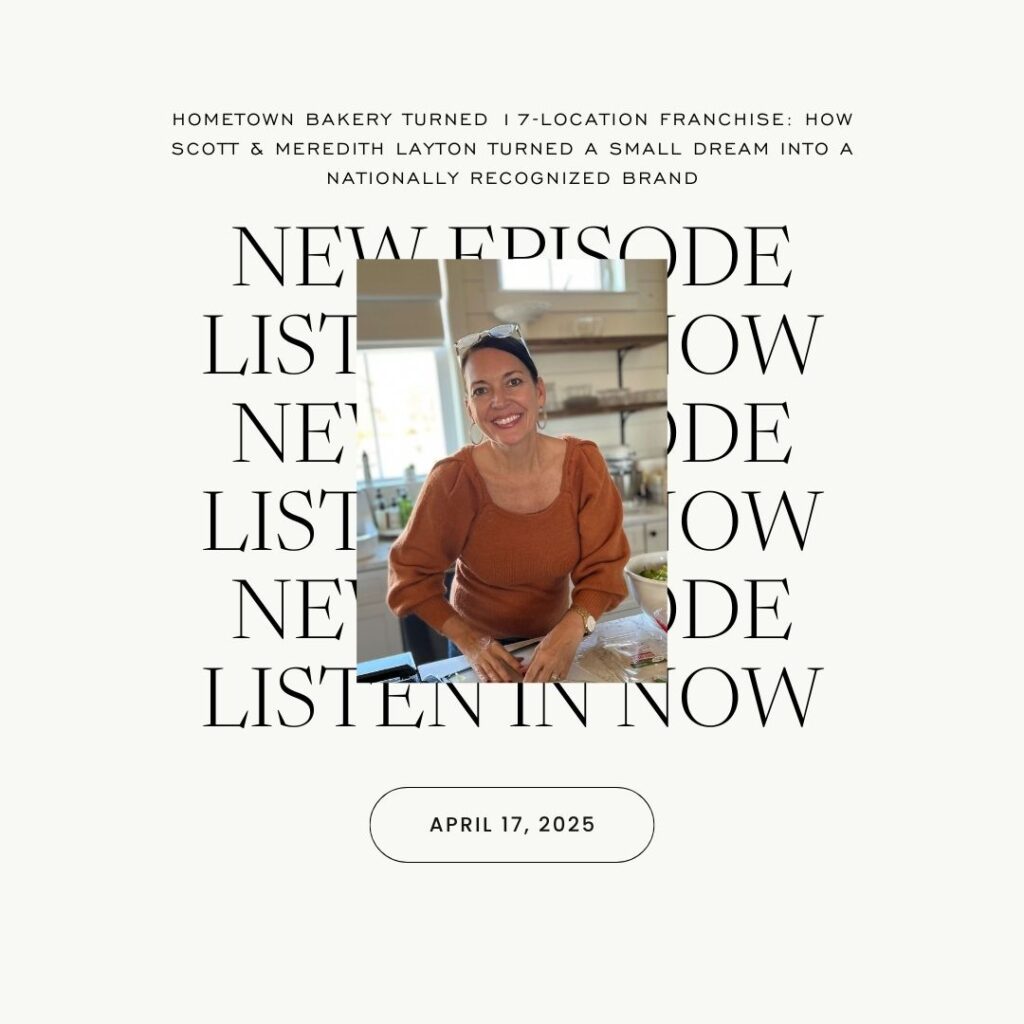
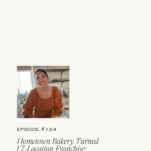
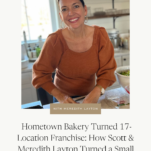
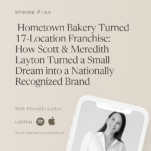
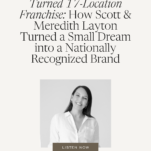

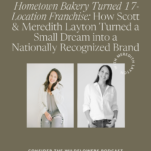
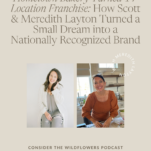
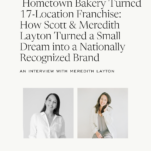
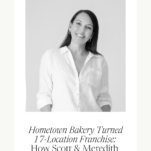
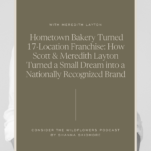

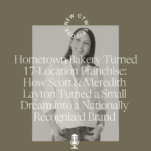
And if you found this helpful, share with your friends!